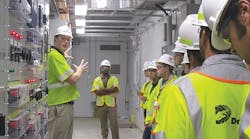Ah, the fanciful thinking of youth. Some grow up wanting to be an astronaut, a fireman or the president. Matt Gardner tipped that thinking on its head. From an early age, he says, he always knew he was going to be an engineer. The big question was what type of engineer?
“I am a third-generation Virginia Tech Hokie,” Gardner starts, referring to the Blacksburg, Virginia, home of Virginia Tech. “The question in my family wasn’t really what do you want to be when you grow up, but rather, when you get out of Virginia Tech, what kind of engineer do you want to be, electrical or mechanical?”
Gardner not only decided on electrical, he in fact “out-Hokie’d” his forefathers by earning both a master’s and Ph.D. in electrical engineering from Virginia Tech. “I never really intended to get a Ph.D.,” Gardner says of his education. “I just liked solving problems and getting things done. But as I was rounding the fourth turn in my undergrad education, I started to get interested in the scale of the electric power system.”
At around that fourth turn — 2003 — fate, Gardner recalls, turned him on to both power systems engineering and further academic study. “The power systems program felt like it was kind of winding down around then,” Gardner offers. “My advisers were saying maybe look at computer chips or motor drives, that might be a better fit. One adviser literally told me to pray for a blackout, maybe that would stir up some funding for power systems.”
Whether Gardner prayed or not, sure enough on Aug. 14, 2003, a high-voltage power line sagged into a tree in Ohio and set off the Northeast blackout, which lasted for up to two days and cut power to an estimated 45 million electric customers in eight different U.S. states, plus an additional 10 million customers in Ontario, Canada.
“That blackout illuminated my career,” says Gardner. “Afterward, we developed a focus on the three T’s – tools, trees and training — and worked on how to use all three to stop this from happening again.”
Today, as a 32-year-old consulting engineer in electric transmission operations engineering for Dominion Virginia Power in Richmond, Virginia, Gardner doesn’t give the impression he’s up cutting trees, but certainly has been working on at least the tools and training aspects. He is a lead engineer on Dominion’s electric transmission smart grid development team, focusing on data gathering and analytical tools, mobile switchgear deployment, high-voltage direct-current lines and substations, gas-insulated switchgear and other developing technologies. He was co-chair of the North American SynchroPhasor Initiative (NASPI) Research Initiatives Task Team, outgoing co-chair of the Engineering Analysis Task Team and vice-chair of the IEEE Dynamic Monitoring Working Group.
“When I first joined Dominion, I was responsible for figuring out where we would go with the smart grid in the transmission phase,” Gardner explains. “Today, we are really at the crossroads of developing our infrastructure. Every time we buy a software or hardware package or computing tool, our engineers have fascinating discussions with the developers. You hear them [the developers] responding, ‘We have never worked with such a big model,’ or ‘We’ve never heard of that.’ We really do push the limits.”
Regarding training, Gardner is heavily involved with local and regional universities to promote advanced engineering education that he thinks will be critical for the utilities of the future. He is currently chair of the University of Tennessee CURENT Industry Advisory Board and a member of the advisory board for The Bradley Department of Electrical and Computer Engineering at Virginia Tech.
“At Dominion, we believe in bringing in a wide variety of undergraduate and graduate students as interns to help us address real-world issues,” Gardner says. “Also, though we have a number of well-trained engineers here at Dominion, we’re not all in a R&D group. We have both predictive and production responsibilities.”
At the same time, Gardner relishes time promoting electrical engineering education and initiatives on college campuses. “I have been honored because I have been given a leadership role in the care and feeding of our relationships with universities here,” he says.
Gardner has also been honored with the birth of three children with his wife, Beth, of five years.
“My kids are four-ish, two-ish and new-ish,” Gardner quips of his boy-girl-boy children, the youngest being just six months old. “That means I really don’t have a time-consuming hobby outside of work. My wife played golf for the University of North Carolina, and sometimes we will go out and try to golf. People admire Beth’s swing, then in the next breath, they tell me if you are just out here to practice, the driving range is over there.”
“With three young kids, we really don’t have much time for that any more anyway,” Gardner reasons. “My hobby really is my wife and family of three young kids.”


